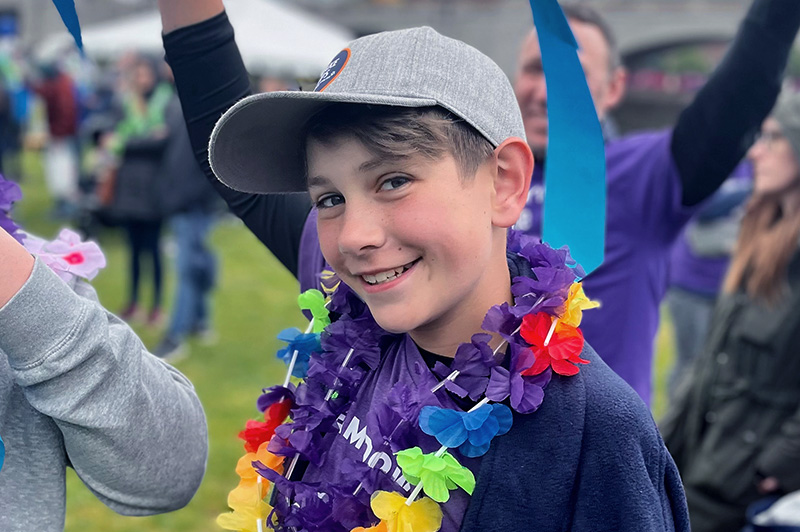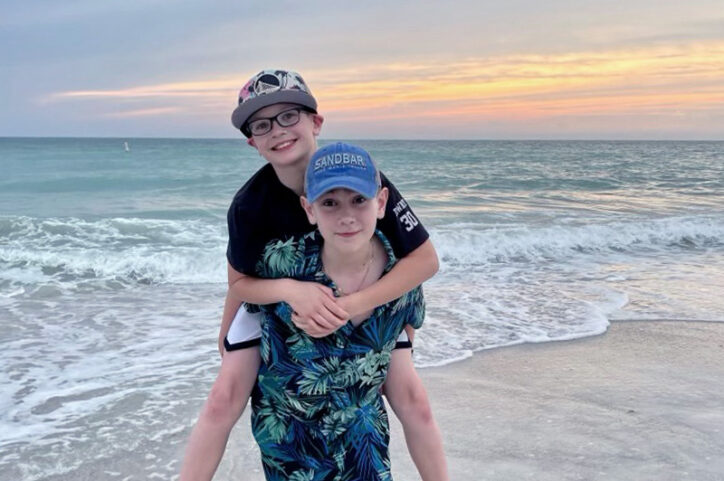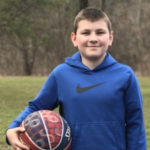Calm through the storm: Connor’s ulcerative colitis journey

When you meet Connor today, he’s a confident 13-year-old who is incredibly laid back when he speaks about his complex medical condition. This school year, he plans on playing basketball and running track. “I like hanging out with my friends and traveling — now I can do all these things without being in pain.” However, Connor traveled quite a long road to find a treatment that worked best for him.
At the beginning of 2021, he started experiencing a lot of stomach problems. “I was going to the bathroom around 20 times a day,” shares Connor. “It was really painful and scary most days.” His pediatrician knew right away that he needed to be seen at Boston Children’s Hospital, and referred him to the Division of Gastroenterology, Hepatology, and Nutrition.
Leaving no stone unturned
After Connor had his first colonoscopy, he was quickly diagnosed with ulcerative colitis — a type of inflammatory bowel disease (IBD) where the inner lining of the large intestine (colon) and rectum become inflamed. Ulcerative colitis can occur at any age, but is more common in older children and young adults. “By the summer of 2021, I was really sick,” remembers Connor. The GI team tried oral medications and different infusions, but nothing worked as a long-term solution. Connor was still in a lot of pain and very weak even after the treatments, which caused him to miss a lot of school and activities and hobbies that he previously enjoyed.
Eventually, Connor and his parents discussed the possibility of surgery with Boston Children’s Medicine United with Surgery in Caring for IBD Patients (MUSIC) Program. His dad, Kevin, notes that the conversation only happened after the MUSIC IBD team tried all other options, which brought comfort to the family. “It was reassuring knowing that the team wasn’t leaving anything unchecked. It was a relief once we were able to get to the surgery option because we knew Connor would be one step closer to living a better life.”
Surgery in three stages
Connor’s surgeon, Dr. Jill Zalieckas, surgical director of the MUSIC IBD Program, and gastroenterologist Dr. Denis Chang discussed with the family what to expect. The surgeries would take part in three stages, with the first procedure taking place in November 2022.
Connor’s initial surgery was a laparoscopic total abdominal colectomy with an ileostomy, where the entire colon was removed but the rectum remains in place. A surgically created opening at the end of the small intestine was brought through the skin of the abdominal wall to form a stoma, or ostomy. The next procedure a few months later was a proctectomy with ileoanal J-pouch creation and ileostomy. A “J pouch” was made from his small intestine, where a reservoir was created with the ileum (last part of the small intestine). The final surgery was an ileostomy “takedown,” in which the end of the ileum was connected to the small intestine leading to the J pouch to re-establish continuity of the intestine. After completion of the three surgeries, Connor was no longer in pain and was able to use the bathroom regularly.
With the surgeries behind him, Connor then was faced with recovery— but that didn’t keep him down, thanks to the support of his family, as well as his care team. That included clinical nutritional specialist Jaclyn Quinlan, who made sure his nutrition was optimized around surgery; clinical social worker Jahna Goldmore, who prepared Connor for his procedure and helped with missed school work; and Dr. Lori Zimmerman, medical director of the MUSIC IBD Program, who managed his medications each step of the way.

Raising awareness through charity
With no need to take medications, Connor sleeps better and can eat most of his favorite foods again without struggle. “Connor is still in the adjustment stage,” Kevin explains. “His care team is still tracking his progress, but as of right now he is miles ahead of where he was before and keeps making incredible improvements.”
While Connor had a positive experience with his surgeries and treatments, he knows that there are other kids with the same or a similar diagnosis that may not be so lucky. That’s why he has worked to raise money for research and treatment for other kids who have ulcerative colitis or Crohn’s disease. “He’s made these conditions a lot more visible, at least within our town and other local communities, which makes a difference in the long term for breakthroughs in medicine to happen,” Kevin says.
Learn more about the MUSIC IBD Program.
Related Posts :
-

Finding hope in hard times: Max's journey with ulcerative colitis and primary sclerosing cholangitis
When Rachel’s son, Max, had a string of persistent symptoms that caused him to be in and out of ...
-

From bench to bedside: A promising option for unremitting ulcerative colitis
Many existing treatments for inflammatory bowel disease, like Remicade® and Humira®, work by blocking inflammatory cytokines such as tumor necrosis ...
-

Could fecal transplants heal Crohn’s and colitis in children? Two trials are set to find out
Could an exciting potential treatment for inflammatory bowel disease (IBD) be found in the gastrointestinal tract itself? That’s the ...
-

IBD surgery gives Ben a new taste for life (and hamburgers)
Ben Irland, 13, has been enjoying a lot of hamburgers lately. It’s an exciting development for him, since until recently ...





